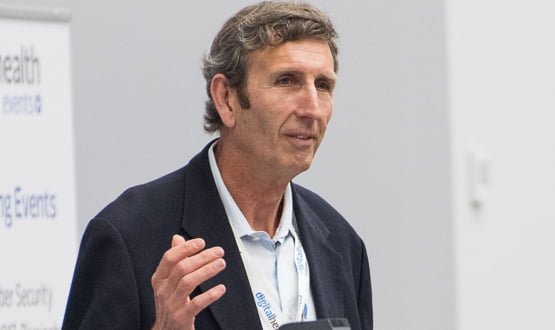Keith McNeil reflects on his role, achievements and challenges his successor faces
- 8 September 2017

Keith McNeil, the first chief clinical information officer (CCIO) for NHS England, talks to Digital Health News – reflecting on his role, achievements and challenges his successor faces.
McNeil recently announced his resignation and will return to Australia in early December where he will take up an assistant deputy director general role at Queensland Health and chief medical information officer at Queensland.
He spoke to Digital Health News at the DigitalHealth.London Accelerator conference on Thursday (7 September) at Kia Oval where he was the keynote.
In true light-hearted Aussie fashion, McNeil opened his speech about reminding everyone who won the first test match on the Kia Oval grounds.
“It’s been an enormous privilege to be involved with the accelerator…but it would be remissive of me, standing here in front of the Oval if I didn’t remind everybody that Australia won the very first Ashes series and I am sure we are all looking forward to the Series coming up – no doubt Australia will also win.”
Digital Health Q&A with McNeil
Reflections on being the first national CCIO
It’s a great honour and real privilege to do the role and set it up. It’s been a challenge to form and put the whole agenda together. There’s been a lot of things that have been going on that needed aligning and bringing in so that everyone is putting in their energy into going in the same direction. We can’t do everything for everybody but what we can do is an awful lot for an awful lot of people and it’s that alignment that makes the difference.
Key challenges your successor is likely to face?
Keeping the momentum is going to be really important. There is a huge momentum building in terms of how big our digital offerings are and how we are we embracing the whole digital landscape across the NHS. It’s about keeping that enthusiasm going. Inevitably the novelty starts to wear off and that’s when the hard grind starts to set in. So, we have got to keep the momentum going because the prize at the end of it is huge. I think that’s the key challenge. And of course, you’re working in a big system and big systems aren’t all that amendable to change so you have to figure out the bite size chunks to work with.

Looking back, what are some of your greatest achievements/ what are you most proud of?
I think the alignment of the program now with what people need on the grounds to deliver good care, what the system wants in terms of Five Year Forward View next steps and the triple aim of healthcare. We have now got the digital programs aligned so that we are delivering into those functional outcomes rather than just delivering bits and pieces. I think that’s probably been the thing I am most happy with, still a bit of work to do there but it has come together really well.
Are you looking forward to going back home and into your new role as Queensland Health and chief medical information officer?
I am going back for personal reasons. I’m not going back for any other reasons and I’ll certainly miss living in the UK, living in Cambridge in particular. But working in this role because of the opportunities it presents is just huge. But yes, I have got a good role in Queensland, across a population of 4.5 million people so I can get my hands a bit dirtier.
As a member of Digital Health CCIO network advisory panel – can you explain its importance?
Firstly, the good thing is that there is a CCIO/ CIO network and it’s really important for the system that, that group comes together and really takes a leadership role in determining what they want and where we are going to go with our digital agenda rather than being dictated to. So that’s a very powerful group with all the content, knowledge, with all the skills and experience there in being able to translate what’s needed on the ground to what’s needed to be delivered at a whole system level.
The networks are dedicated to promoting the development of CCIOs, CNIOs and CIOs across the NHS, greater collaboration and best practice.
Highlights from McNeil’s keynote at the DigitalHealth.London Accelerator conference
I just turned 60 a couple of months ago and I was reflecting on what has happened in my life. I have seen the Berlin wall come up and come down, I’ve seen Great Britain join the common market and the EU, then leave the EU and one morning for crying out loud I woke up and found Donald Trump was the president of the United States.
Our life is about change… and healthcare is no exception. Of course, the trick to dealing with change is how you adapt. That’s what we have to be; we have to be adaptable to change in healthcare and as you all know in big systems that’s very hard. The key to adapting to change is innovation. Systems don’t innovate, people innovate and the challenge for the healthcare system is to set itself up, design itself so we can unleash innovation.
When I came into this role 12 months ago I was faced, if you like, with a mist and there wasn’t much shape or purpose to it as it seemed. A lot of good work had been done in bringing things together across the national information board program, the so called 2020 program. And we have taken that and given it a good shake. We must embrace the digital agenda across the healthcare system and the NHS.
We need machine learning and AI algorithms to really drive this agenda forward.
So, what are we doing at the NHS to really embed the systems that we need. We are empowering patients for a start – it’s really important we do that. We need to give them the opportunity to embrace the digital agenda. I grew up without the internet but had to learn to adapt to it.
It’s been a great privilege to have stood in this role… I’m leaving when it’s all starting to get going. A lot of good stuff is happening and happened over the last 12 months.
But we need you to come to this party and be telling us what you need as patients, entrepreneurs and innovators to deliver better care. At the end of the day it’s all about better patient outcomes, better patient experience and building a sustainable health system and we can only do that by embracing innovation and doing something differently.





7 Comments
Culture change and education is needed . The facility to share GP Detailed Coded Records with patients has been in place since it became part of the GP contract in March 2016. There is huge inequitable access across England with many practices refusing to participate while other forward thinking practices offer Full Record Access to their patients. Partnership working with patients and the acceptance that patients want their data so they can contribute to their own care and medical decisions is a culture change that will be hard to implement. My GP thinks it is not appropriate for me to know blood test values if he says it is normal apparently that is enough for him. Patients like me are forced to issues an SAR for a copy of full records yet 40 miles down the road they are offered free. Who is charge? Who is the patients champion? Who will enforce the basic access referred to in the GP contract. Certainly not NHS Digital their helpline doesn’t even recognise the terminology of Detailed Coded and informed me about a charge to see it! They need to get their house in order and at least confer with PatientOnline so they all speak the same language.
100% agree with Di excellent post. i have been working in NHS for 3yrs, the technology is not an issue we are way more technologically advanced for NHS needs. The issue is organisations buying products to plug gaps and building up technology debt in the NHS. We dont need new system we need change management, get policies & procedure in order and centralise where possible. Change mgt need to reflect the patient is the focus and GPs etc need to accept that & get on board.
John, NHS Digital are there to drive efficiency within the NHS from a digital perspective. To save costs and have a more integrated system that’s quick and easy to access, the only way forward is to try and as digital a solution for the entire NHS as possible.
totally agree with you anon, it is the fairest way to go4all, the most efficient way to go and with tech being as powerful as IT is these days there can be no more excuses, in my honest and personal opinion NHS Digital holds the key to the future success of the NHS but it needs the aPpropriate resource and i do not mean money …
I still don’t get what NHS Digital do.
they do some stuff, but is IT running efficiently ? this is not an academic question, tech is v powerful NOW, with the app ropriately skilled people running IT you do not need to spend a ton of money in order to crunch and i(ntegrate)Care data, yes tons and tons of it in no time @ all !!!
what i need and expect for my cuurent and future family (hopefiully) and froends from a NATIONALhealth service is EQUAL and fair access to our health data who ever provodes IT and whereever wer may live in the country – well done to the eNgland cricket team, great winning performance !
Comments are closed.